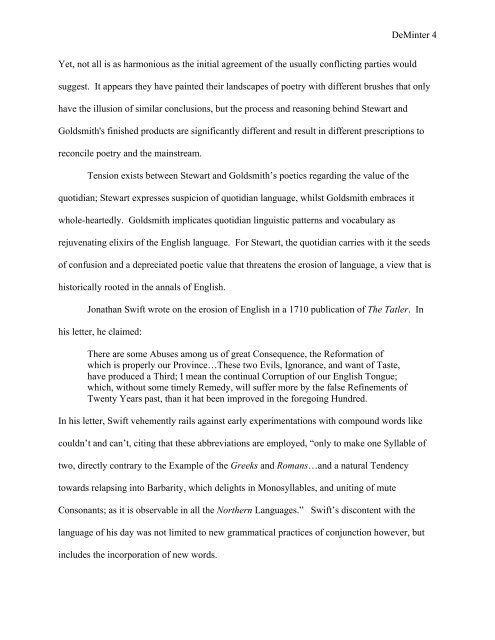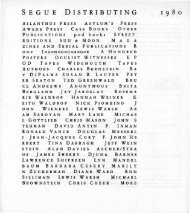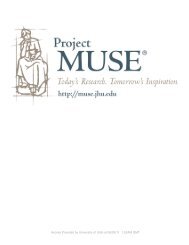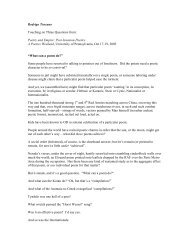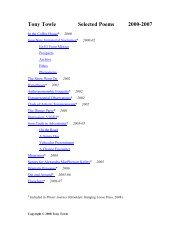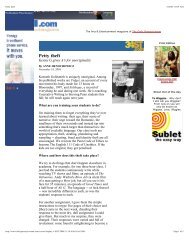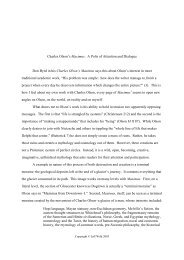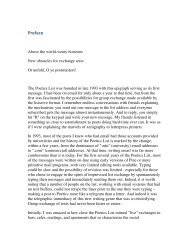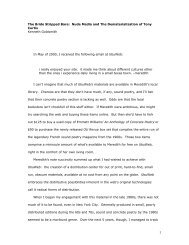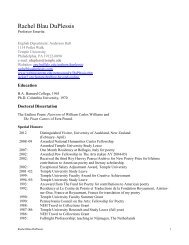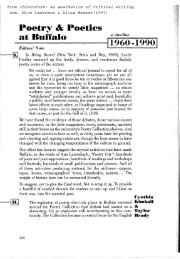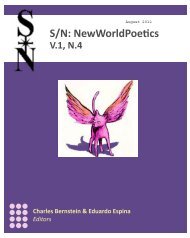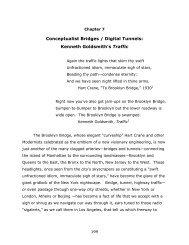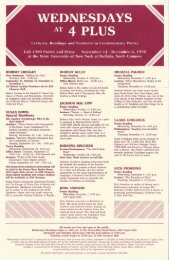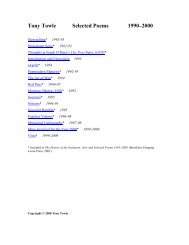P's and Q's of Poetry - Electronic Poetry Center
P's and Q's of Poetry - Electronic Poetry Center
P's and Q's of Poetry - Electronic Poetry Center
Create successful ePaper yourself
Turn your PDF publications into a flip-book with our unique Google optimized e-Paper software.
DeMinter 4<br />
Yet, not all is as harmonious as the initial agreement <strong>of</strong> the usually conflicting parties would<br />
suggest. It appears they have painted their l<strong>and</strong>scapes <strong>of</strong> poetry with different brushes that only<br />
have the illusion <strong>of</strong> similar conclusions, but the process <strong>and</strong> reasoning behind Stewart <strong>and</strong><br />
Goldsmith's finished products are significantly different <strong>and</strong> result in different prescriptions to<br />
reconcile poetry <strong>and</strong> the mainstream.<br />
Tension exists between Stewart <strong>and</strong> Goldsmith’s poetics regarding the value <strong>of</strong> the<br />
quotidian; Stewart expresses suspicion <strong>of</strong> quotidian language, whilst Goldsmith embraces it<br />
whole-heartedly. Goldsmith implicates quotidian linguistic patterns <strong>and</strong> vocabulary as<br />
rejuvenating elixirs <strong>of</strong> the English language. For Stewart, the quotidian carries with it the seeds<br />
<strong>of</strong> confusion <strong>and</strong> a depreciated poetic value that threatens the erosion <strong>of</strong> language, a view that is<br />
historically rooted in the annals <strong>of</strong> English.<br />
Jonathan Swift wrote on the erosion <strong>of</strong> English in a 1710 publication <strong>of</strong> The Tatler. In<br />
his letter, he claimed:<br />
There are some Abuses among us <strong>of</strong> great Consequence, the Reformation <strong>of</strong><br />
which is properly our Province…These two Evils, Ignorance, <strong>and</strong> want <strong>of</strong> Taste,<br />
have produced a Third; I mean the continual Corruption <strong>of</strong> our English Tongue;<br />
which, without some timely Remedy, will suffer more by the false Refinements <strong>of</strong><br />
Twenty Years past, than it hat been improved in the foregoing Hundred.<br />
In his letter, Swift vehemently rails against early experimentations with compound words like<br />
couldn’t <strong>and</strong> can’t, citing that these abbreviations are employed, “only to make one Syllable <strong>of</strong><br />
two, directly contrary to the Example <strong>of</strong> the Greeks <strong>and</strong> Romans…<strong>and</strong> a natural Tendency<br />
towards relapsing into Barbarity, which delights in Monosyllables, <strong>and</strong> uniting <strong>of</strong> mute<br />
Consonants; as it is observable in all the Northern Languages.” Swift’s discontent with the<br />
language <strong>of</strong> his day was not limited to new grammatical practices <strong>of</strong> conjunction however, but<br />
includes the incorporation <strong>of</strong> new words.


